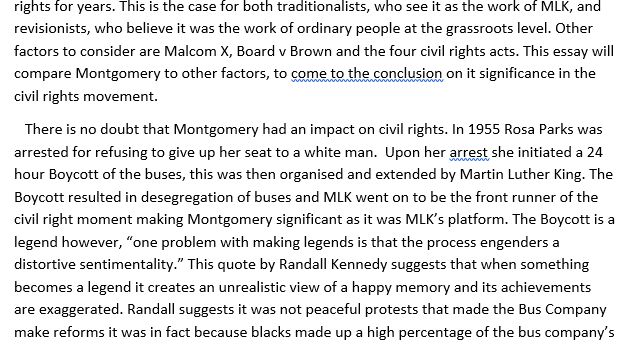To help you learn how to write history coursework for GCSE, you can find a wealth of free GCSE essay examples online. The aim of GCSE History is to study people and events from the past, using original sources and documents as sources for analysis and evaluation. You can get started on your History essay today by looking at some of the examples at Marked by Teachers. Here are some of the most important tips:
Prepare for Paper 2
To prepare for Paper 2 when writing history coursework, you should familiarise yourself with the issue that will be covered on the exam. Although the issue may change from year to year, the question format remains the same. Regardless of the issue, it is important to know what to include and exclude. Here are some tips to help you prepare. You should also be familiar with the syllabus and the ‘Paper 2 Topic’ document in your Canvas.
The best history students can build arguments, both in their writing and in class discussions. This is because the Form 4 programme of study is designed to help students prepare for the iGCSE and the assessment. For example, the history literacy periodic table displays suggested readings and films for each section of the course. Another great idea is to watch films about international relations. This can help students better understand the different perspectives represented in history.
You should also start preparing for Paper 2. The paper is traditionally split into five sections, each containing five questions. You should study two of these sections thoroughly, ensuring that you have a thorough understanding of them. The questions vary from open-ended to narrowly-focused. You should be familiar with each topic section, as well as the questions that will be asked on it. If you are unsure, look up the syllabus and ask someone who knows history to clarify the topics.
Organize chronologically
In history, organizing chronologically is important, even for coursework. Chronological order has been used by famous authors and student essayists, and you can use the same approach when writing a speech. Chronological order is fixed according to the time periods in which the events occurred. This method of writing has many advantages, and should be used by students to maximize their marks. If you find yourself unable to stick to a fixed order, try to research the topic thoroughly.
Compare and contrast similar events
You must write an essay to show the difference between two similar events. The essay should be written in chronological order, but you can also compare and contrast different events. Make sure that you acknowledge both sides of a story, as the question may ask for a comparison of a particular event or person. You should also acknowledge how different events and people affect the world today. Your essay should be academically accurate, so the examiner will be impressed.
To prepare for this coursework, you need to know how to compare and contrast events in history. You can refer to a textbook or the internet to find examples and help with the process. You must understand the history of the event you’re comparing, as this is the most common type of coursework. You can also do the research yourself. You can check out various sites for helpful information, or you can make a quick google search.
Provide a conclusion
You must provide a conclusion when writing history coursework for IGCSE. History is always written by the victor. There are many different perspectives on any topic, event, or situation. It is very difficult to persuade an examiner of one side without swaying their opinion. But there are techniques you can use to help you come up with a valid argument, like statistics or logic.
When writing a conclusion, you should use a phrase that summarizes your main points. You can use ‘to conclude’, but it’s not very effective when writing. Start by using your original opening sentence, and then use ‘ultimately’ or similar words to connect to the body of your essay. Remember that the conclusion should be brief and summarize your strongest points. Don’t provide lengthy explanations here; just restate the main points in simple terms.
Organize a GE graph
To make your geography coursework interesting, you need to focus more on the analytical aspect. For this, you will need to include at least four types of graphs. Your teacher can suggest additional types of graphs if necessary. While building a GE graph will take more time than creating an excel column graph, you will stand out with this format. Listed below are a few tips to help you build a GE graph.
Organize a column graph
In your IGCSE geography coursework, you need to understand how to organize a column graph. To do this, you need to know the IGCSE Geography syllabus and the top marks for each of the three units. Then, you need to organize a column graph in a particular way to fit these objectives. You can also make use of other types of graphs, including line graphs and bar charts.

